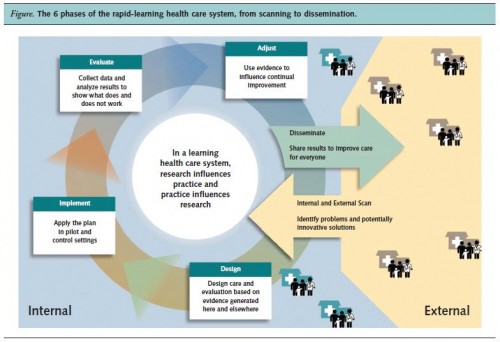From “Implementing the learning health system: from concept to action,” by Sarah Greene, Robert Reid, and Eric Larson:
[In the learning health care system] evidence informs practice and practice informs evidence.
Isn’t that delightfully concise? Their chart:
From “Learning health care systems and justice,” by Ruth Faden, Tom Beauchamp, and Nancy Kass:
[W]e focus on providing a justification for learning in health care as a morally essential, not morally optional, feature of a health care system. […] The required justification rests on two empirical assumptions: 1) a just health care system cannot be secured without continuous commitment to improving the quality and efficiency of health services, and 2) honoring this commitment depends on efficiently integrating into clinical service delivery a wide range of learning activities, including those conventionally classified as research.
More on this theme by Ruth Faden and colleagues here. However, I read it as an articulation of a moral framework but not an argument for its justification. Perhaps I missed something.
I do not doubt one could make such an argument, and a compelling one, I just didn’t see it. Note that probably that argument applies to far more than the health care system. Broadly, what’s the moral case for continuous learning and improvement of any enterprise whose purpose is to improve human welfare? That question almost answers itself, doesn’t it?
The rest of TIE’s learning health care system posts are here.



